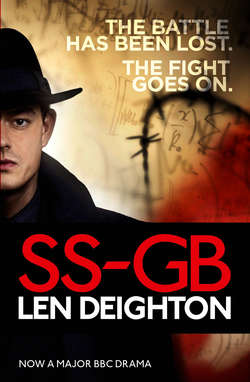Читать книгу SS-GB - Len Deighton - Страница 13
Chapter Six
ОглавлениеAnd so, at the very time when General Kellerman, HSSPf (Senior SS and Police Leader) Great Britain, was playing host to some of the senior officials in London, their guest of honour was in a mortuary behind Baker Street wearing a white butcher’s apron and watching Peter Thomas’s corpse being slashed open by Sir John Shields, the pathologist.
It was a grim little building, set back from Paddington Street by enough space for the hearses and ambulances to unload behind the oak doors that make the entrance so innocuous to passers-by. The interior of the mortuary building had received so many coats of dark green and brown paint that the brickwork was now smooth and shiny, like its stone stairs and polished wooden floor. The low-power light bulbs provided only small puddles of dull yellow light, except where a green-shaded brass lamp had been pulled down close to Peter Thomas’s pale dead belly.
There were nine people present: Huth, Sir John Shields and his assistant, Douglas Archer, a man from the coroner’s office, a clerk, two mortuary workers in rubber aprons and waterproof boots, and a fussy little German police Major who had also flown in from Hamburg that day. He took notes, and continually asked for translations of bits of Shields’s impassive commentary. There were too many people round the slab, and Douglas readily conceded his place in the front row. He had no taste for these gory excursions, and even with his eyes averted, the sounds of the knife and hacksaw and the gurgling liquids made him want to retch. ‘Haemorrhage, haemorrhage, haemorrhage!’ said Shields, indicating with the knife. They peered closely at the dead man’s insides. ‘I don’t like the look of his liver,’ said Shields, grabbing it, cutting it free and holding it nearer to the light. ‘What do you think, doctor?’ His voice echoed in the dark mortuary.
Shields’s assistant prodded the liver, and looked at it through a magnifying glass for a long time. Shields bent down to sniff at the corpse.
‘Explain to me,’ said Huth impatiently.
‘Diseased,’ said the doctor. ‘Most interesting. I’ve never seen one quite like it. I wonder how the fellow kept going.’
The little German police Major was scribbling in his notebook. Then he, too, wanted to look at the liver through a magnifying glass. ‘How near to death was he due to failure of the liver?’ he asked in German and waited while his query was translated by Huth.
‘I’d not like to answer that,’ said Sir John. ‘A man can go the devil of a time with a bad liver – you should see the chaps at my club!’ He laughed.
‘This is not a joke,’ said Huth. ‘Was the man sick?’
‘He certainly was,’ said Sir John.
‘To death?’
‘I wouldn’t have given him more than a couple of months, would you, doctor?’
Sir John’s assistant demonstrated agreement by means of a noisy intake of breath, and a slight shake of the head.
Huth put his arm round the shoulder of the Major and steered him away, out of earshot, where they stood and whispered together. Sir John clearly thought this a breach of good manners and he did nothing to hide his annoyance.
When Huth returned to the slab he told Sir John that he would want all the internal organs packed and ready to be flown to Berlin on the next day’s flight from Croydon.
‘Then there is nothing to keep me here,’ said Sir John Shields.
‘Don’t be offended, Sir John,’ said Huth with a smooth charm that Douglas had not seen him use before. ‘We’ve no one in Berlin with your knowledge and experience. I’m hoping very much that you and your colleague will continue with the postmortem so that we can have a report by tomorrow morning.’
Sir John took a deep breath, and came to his full height, as Douglas had seen him do so often in the law courts just before crushing some overconfident counsel. ‘There can be no question of my attempting any further examination of this body without the facilities of a hospital laboratory, fully equipped and fully staffed.’
Huth nodded but said nothing.
Sir John continued. ‘Even then, it would be a long job. All the London hospitals are overworked to a point of near exhaustion, and that for reasons that I will not embarrass you, or your army colleague, by elaborating.’
Huth nodded gravely. ‘Of course not. And that’s why I have arranged for the SS Hospital, at Hyde Park Corner, to have their laboratory entirely at your disposal. I have two cars and an ambulance here, a telephone line has been kept clear for you and you have only to ask for any extra personnel and materials.’
Sir John looked at Huth for a long time before answering. ‘I would like to believe, Brigadier, that this extraordinary display of German military resource is a compliment to me. However, I suspect it is more accurately a measure of your concern with this particular death. I’d therefore appreciate it if you’d be a little more forthcoming about its circumstances – and what you know already.’
‘Standartenführer,’ said Huth, ‘Standartenführer, not Brigadier. All I can tell you, Sir John, is that I dislike mysteries even more than you do, and that especially applies to mysterious death.’
‘Epidemic?’ said Sir John. ‘Contagious disease? Virus? Plague? Pestilence?’ His voice rose a fraction. ‘You mean you’ve seen something like this before?’
‘Some of my staff have seen something like this before,’ admitted Huth. ‘As for plague and pestilence, we’re dealing with something that could prove so deadly that not even the Black Death would compare with the consequences – at least, that’s what my experts tell me.’
